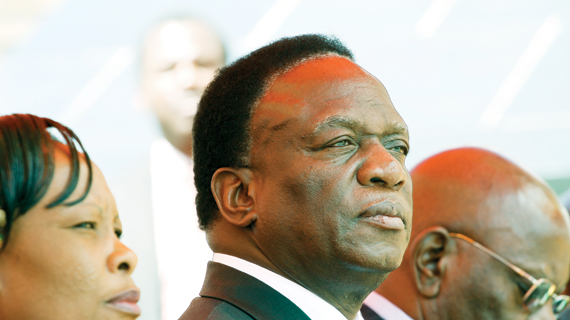
LABOUR is worried that President Emmerson Mnangagwa appears bent on pursuing neoliberal austerity and free market policies that ignore workers’ rights.
BY MTHANDAZO NYONI
Their fears stem from the fact that the president has already met everyone else except representatives from their constituency.
Mnangagwa, who assumed the reins in November after a coup, has met a number of sectors such as business, youths and chiefs through consultative meetings.
Labour and civil service unions who spoke to Standardbusiness last week said Mnangagwa’s actions showed that he was not concerned about their welfare.
“We are very suspicious of his behaviour because when you are talking about labour you are talking about the backbone of the economy. We are the people that make the economy tick,” Zimbabwe Congress of Trade Unions (ZCTU) western region chairperson Ambrose Sibindi said.
“If President Mnangagwa was serious about reviving the economy, he should have met labour also. He should have met labour before running all over the show.”
He said Mnangagwa should have come and explain to workers what happened to the promised two million jobs.
- Chamisa under fire over US$120K donation
- Mavhunga puts DeMbare into Chibuku quarterfinals
- Pension funds bet on Cabora Bassa oilfields
- Councils defy govt fire tender directive
Keep Reading
Under former president Robert Mugabe’s administration, government promised to create over 2,2 million jobs through its economic blueprint — the Zimbabwe Agenda for Sustainable Socio-Economic Transformation. Experts say government’s policies have led to further job losses.
ZCTU secretary-general Japhet Moyo lamented that labour was not Mnangagwa’s priority, saying “the State has voluntarily given itself to capital”
“I don’t think labour is important in his trajectory. What is important to him is capital. We wrote to the new administration regarding challenges faced by workers, especially Hwange Colliery Company workers, but he never bothered to respond to our issues. They have never bothered even to acknowledge receipt of our letter,” Moyo said.
Progressive Agriculture and Allied Industries Workers’ Union of Zimbabwe general secretary Raymond Sixpence said they also wrote a letter to Mnangagwa, soliciting for a meeting with him but never got a response.
“We have written to him requesting to have a meeting with him, but we have not yet received any response. We would like to meet with him because it’s not fair for the president to meet businesses only. We are appealing for him to come and meet with us,” he said.
Progressive Teachers’ Union of Zimbabwe secretary-general Raymond Majongwe said as civil servants they were very disappointed by Mnangagwa’s behaviour.
“It shows that we are not on his priority list. If he is not going to meet us on his terms, he is going to meet us on our terms. Former president Robert Mugabe lost credibility because he didn’t listen to what workers were saying,” Majongwe said.
Zimbabwe Teachers’ Association chief executive officer Sifiso Ndlovu said it would appear workers were inconsequential.
“It shows that government’s open for business mantra is a liberal agenda which seeks to push away the workforce,” Ndlovu said.
Amalgamated Rural Teachers’ Union of Zimbabwe president Obert Masaraure said Mnangagwa was completely divorced from issues affecting workers.
“To him, workers don’t mean anything,” he said.
Workers said whilst they welcomed statements on economic recovery plans involving businesses and investors, this could not be done at the exclusion of workers and trade unions who were key stakeholders.
They said the role that workers played in economic development was critical and should never be undermined by the government.
Workers in Zimbabwe are living in abject poverty as the majority of them are poorly remunerated and not paid on time.
Recently, more than 300 women besieged Hwange Colliery Company (HCCL) demanding the payment of their spouses’ outstanding wages.
Government is one of the largest shareholders in HCCL.
Due to poor working conditions as well as poor remuneration, doctors and other workers in the health sector have gone on strike. Doctors are threatening not to return to work until the government meets their demands for better pay and working conditions.
The consequences have been disastrous for the ordinary Zimbabwean who cannot afford private hospital fees.
Teachers, on the other hand, have threatened a crippling industrial action when schools open for the second term to force the government to increase their salaries by 100%. They also want their housing and transport allowances increased by 50%.
Contacted for comment, Information, Media and Publicity acting minister Simon Khaya Moyo referred all the questions to presidential spokesperson George Charamba, whose phone went unanswered.
“Will he be able to meet all the people, really? Can you please get in touch with Charamba,” Khaya Moyo said.
Workers have been getting the short end of the stick more so following the July 2015 Supreme Court ruling, which gave employers the right to terminate contracts on three months’ notice.
Companies have been struggling to stay afloat resulting in a number failing to pay salaries and wages. According to a report by the Labour and Economic Development Research Institute of Zimbabwe (Ledriz), 80 000 workers did not receive their wages and benefits on time in 2014 out of the 350 000 workers in formal employment.
According to a report by Ledriz and The Solidarity Centre, the failure to pay what workers are legally entitled to is wage theft. It is also a violation of international labour standards, as well as national legislation on the employment of workers.
“Wage theft affects an estimated 22 000-plus workers for urban councils (local government entities), 12 000 in agriculture and more than 7 500 each in the security sector, automotive industry and railways,” said the report, Working Without Pay: Wage Theft in Zimbabwe.
Employers blame the deteriorating economic environment for the poor working conditions and have had to resort to job culls.










